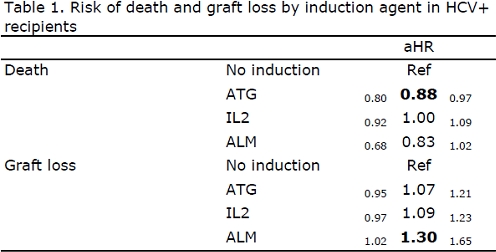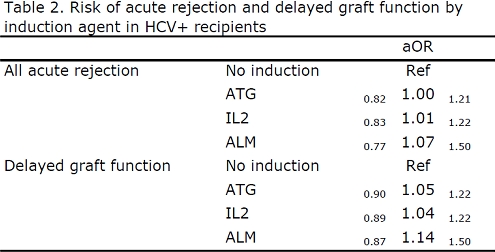Induction Immunosuppression and Post-Transplant Outcomes in Kidney Recipients with Hepatitis C Virus.
Johns Hopkins, Baltimore, MD.
Meeting: 2016 American Transplant Congress
Abstract number: 521
Keywords: Hepatitis C, Induction therapy
Session Information
Session Name: Concurrent Session: Kidney: Induction Therapy 2
Session Type: Concurrent Session
Date: Tuesday, June 14, 2016
Session Time: 4:30pm-6:00pm
 Presentation Time: 5:18pm-5:30pm
Presentation Time: 5:18pm-5:30pm
Location: Room 312
Kidney transplantation is a well-established treatment option for ESRD patients with Hepatitis C virus (HCV). However, the optimal induction regimen for this population is uncertain, mainly because a stronger immunosuppression may increase HCV viral load and eventually hasten the progression to liver fibrosis.
Methods: Using SRTR, we compared patient/graft survival, acute rejection in the 1 year post-transplant, and delayed graft function (DGF) in 10,617 HCV+ recipients between 1999-2014 by induction regimen. We used shared frailty Cox models and mixed-effects logistic regressions to adjust for the differences among transplant centers.
Results: Factors associated with use of depleting agents were recipient age<40, recipient African American race, PRA>80, longer time on dialysis, and living donor. Regimen choice was also largely explained by center-level variations (ICC=0.41). The hazard of death was significantly lower among those who received anti-thymocyte globulin (ATG) than the no induction group (aHR=0.800.880.97). Alemtuzumab (ALM) group was also at a slightly lower hazard of death, but the difference was not statistically significant (aHR=0.680.831.02). IL-2 receptor antagonist (IL2) recipients were at a similar hazard of death compared with no induction (aHR=0.921.001.09). The hazard of graft loss was higher in the ALM group (aHR=1.021.301.65) but not in the ATG or IL2 groups compared with the no induction group (aHRs=0.951.071.21 and 0.971.091.23; Table 1). Acute rejection and DGF were generally similar between the groups (Table 2).
Conclusion: Despite the concerns on the possible adverse effect of immunosuppression on HCV management, our results suggest that ATG is an appropriate induction protocol for HCV+ recipients.


CITATION INFORMATION: Bae S, Durand C, Kucirka L, Massie A, Segev D. Induction Immunosuppression and Post-Transplant Outcomes in Kidney Recipients with Hepatitis C Virus. Am J Transplant. 2016;16 (suppl 3).
To cite this abstract in AMA style:
Bae S, Durand C, Kucirka L, Massie A, Segev D. Induction Immunosuppression and Post-Transplant Outcomes in Kidney Recipients with Hepatitis C Virus. [abstract]. Am J Transplant. 2016; 16 (suppl 3). https://atcmeetingabstracts.com/abstract/induction-immunosuppression-and-post-transplant-outcomes-in-kidney-recipients-with-hepatitis-c-virus/. Accessed February 15, 2026.« Back to 2016 American Transplant Congress
